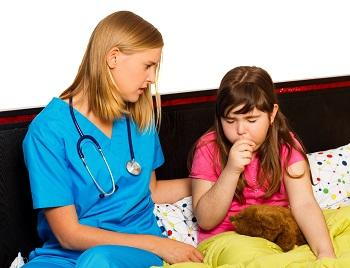Named after the characteristic sound of its notorious coughing fits, whooping cough is an extraordinarily uncomfortable condition that typically manifests itself in babies and in children ages 11 to 18 whose vaccine-provided immunities have begun to fade. In addition to causing several debilitating symptoms, whooping  cough also carries the possibility of infant mortality, particularly for patients under 12 months old. Further complicating the matter, initial symptoms often resemble a common cold, making quick detection a tricky task. To be more proactive in the treatment and prevention of this disease, read below to learn the basics on whooping cough and how to best go about alleviating it.
cough also carries the possibility of infant mortality, particularly for patients under 12 months old. Further complicating the matter, initial symptoms often resemble a common cold, making quick detection a tricky task. To be more proactive in the treatment and prevention of this disease, read below to learn the basics on whooping cough and how to best go about alleviating it.
What is Whooping Cough?
Officially diagnosed by the name pertussis, whooping cough is a highly contagious bacterial infection that resides within the nose and throat. Whooping cough is spread through airborne bacteria produced by an infected person’s sneezes, coughs, or laughs. Once whooping cough has been contracted, the apparent symptoms begin in an identical fashion to the common cold. That includes:
-
Runny nose
-
Mild cough
-
Fever (below 102 F)
-
Congestion and sneezing
After a week to 10 days, these symptoms begin to grow worse. Mucus thickens and starts to coat the patient’s airways, leading to rampant and prolonged coughing. These fits can be so violent that that they may cause vomiting, lengthy periods of extreme fatigue, and result in blue or red face. This last sign is the direct outcome of the body’s struggle to fill the lungs with air, and once breathing is finally achieved, the loud “whooping” sound that defines the condition is produced.
What are the Dangers of the Disease?
If left untreated, whooping cough can produce a number of painful and dangerous complications, with the specific ailments depending on the age of the patient.
For teens and adults, untreated whooping cough can result in:
-
Abdominal hernias
-
Bruised or cracked ribs
-
Broken blood vessels in the skin and whites of the eyes
For infants, complications from whooping cough are a great deal more severe. They include:
-
Pneumonia
-
Slowed or stopped breathing
-
Feeding difficulties, which may lead to dehydration and severe weight loss
-
Seizures
-
Brain damage
What Can I Do About It?
The best approach to preventing the disease is through vaccination. This is especially important for babies, as whooping cough leaves them in significant danger, though it is essential to keep your children on regular vaccination schedules, regardless of their individual age.
While vaccines are extremely effective in reducing the likelihood of contracting whooping cough, the possibility of developing the condition is still present. Due to this perpetual risk, if you witness your child’s cold symptoms continuing to worsen, arrange an appointment with their local pediatrician to find out if the problem may be whooping cough. If diagnosed early enough, antibiotics can be used to cut down on the painful symptoms and prevent the infection from spreading to others.
Concerned? Give Us a Call
Whooping cough is a serious condition that can be extremely dangerous if left untreated. If you have any suspicions that your child may have developed this condition, give us a call today!








